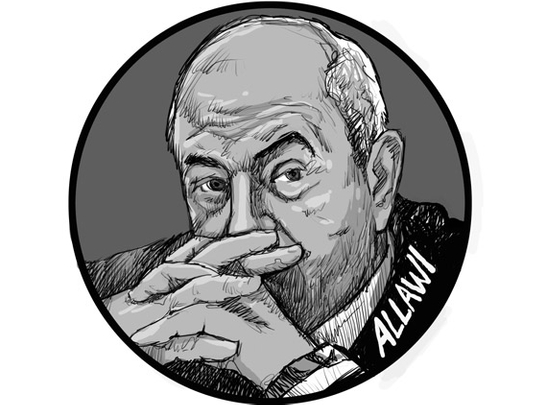
Eyad Allawi has finally backed down, accepting Nouri Al Maliki as the next Iraqi prime minister and settling for a new post created exclusively for him, head of the National Council for Strategic Policy. This puts an end to the eight-month tug of war in Iraq between Allawi, who won 91 parliamentary seats in the March elections, and Al Maliki, who secured 89.
Neither politician had enough votes to secure the 163-seat majority required to create a Cabinet, sending Iraq into an unprecedented period of political stalemate, which seemingly came to an end during a parliamentary session on November 11. It took serious lobbying by heavyweight neighbours such as Saudi Arabia, Iran and Syria to hammer out a deal in Iraq, and a phone call from US President Barack Obama to Allawi, assuring him that the new post would have real political powers, almost comparable to those of the premiership, and would certainly not be ceremonial. The newly created post, whose mandate needs to be charted within the next 15 days, is not mentioned in the Constitution and requires the approval of parliament.
In addition to the new post, Allawi got to name the speaker of parliament, Osama Al Nujaifi, and will also appoint the next Foreign Minister in the Al Maliki Cabinet, along with seven other ministers. Reportedly, his choice for the post of foreign minister is, like him, a secular figure: Saleh Al Mutlaq. Al Mutlaq was barred from participating in the March elections because of his alleged ties to the Iraqi Baath Party. Many questions, however, remain. What exactly will the new council, which has been tailor-made for Allawi, be mandated to achieve? What will its powers entail? Who will it report to and to what extent will there be an overlap, and perhaps conflict, between it and the Cabinet?
What we do know is that, according to Article 108 of the Iraqi Constitution, independent bodies can be created in Iraq, whenever the need arises, to contribute to nation-building and implementation of government strategy. If Article 108 is the legal basis on which the council will be established, will Allawi's new body enjoy the status of an "independent" body? And if this is the case, will it be able to influence decision-making in Baghdad or will government authorities treat it merely as an advisory board that reports to the government?
Reportedly, the new council will operate under the umbrella of the Iraqi executive branch and will replace the National Security Council, which is already in place. According to sources in Baghdad, it will be mandated to monitor government ministers and make sure that they carry out their duties according to the Constitution. Additionally, the council will have several branches: (domestic) Political Affairs, Foreign Policy, Economic and Monetary Affairs, Security and Military Affairs, Energy, Oil and Gas, Electricity, Water, and Environmental Affairs.
Big promises
It will be charged with coordinating policy in these areas among government agencies and between them and the Prime Minister's Office. The council will have a president, or secretary-general, an entire staff and premises allocated by the Iraqi government in Baghdad. The council will also have its own budget, which is yet to be determined but will equal that of the premiership, the parliamentary speaker and the presidency. Allawi will reportedly be entitled to approximately 100 advisors and two military units to protect him and the council from terrorist operations.
It is still unclear whether the National Council will permanently be under Iraqiya's control, or whether different parties or sects will form its leadership in future years. Iraqis also need to decide whether the council's leader will always be a Shiite, given that Allawi is a Shiite, or whether Sunnis, Kurds and Christians will be entitled to compete for the post. According to the post 2003 division of Iraq, the Kurds were awarded the presidency (with the brief exception of Ghazi Al Yawer), the Sunnis the speakership of parliament and the Shiites the premiership. If the new council will have powers equal to that of the prime minister, will it become part of the sectarian division of power in Iraq?
Creation of new governmental bodies to resolve conflict or facilitate a political process is not new; the Iranians did it in 1988, nine years after the Islamic Revolution, when the Expediency Discernment Council of the System was founded to resolve conflict between the Iranian Majlis and the Council of Guardians. That required amendment of the Constitution and the council's authority was eventually expanded to become an advisory board to the supreme leader, with a supervisory role over all branches of government. Its current president, Ali Akbar Hashemi Rafsanjani, yields heavyweight influence in Tehran, often rivalling that of President Mahmoud Ahmadinejad. Whether the Iraqi National Council for Strategic Policy will mature into such a powerful body or remain nothing but a symbolic entity crippled by red tape and government bureaucracy depends on the vote of Iraqi parliamentarians, Al Maliki's willingness to share power and the leadership skills of Allawi.
Sami Moubayed is editor-in-chief of Forward Magazine in Syria.












